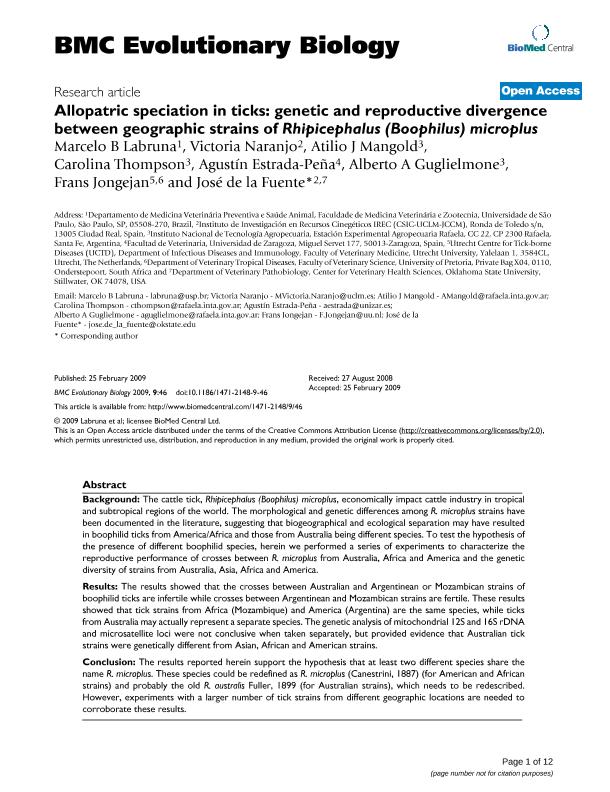Mostrar el registro sencillo del ítem
dc.contributor.author
Labruna, Marcelo B
dc.contributor.author
Naranjo, Victoria
dc.contributor.author
Mangold, Atilio Jose

dc.contributor.author
Thompson, Carolina Soledad

dc.contributor.author
Estrada Peña, Agustín
dc.contributor.author
Guglielmone, Alberto Alejandro

dc.contributor.author
Jongejan, Frans
dc.contributor.author
de la Fuente, José
dc.date.available
2020-04-06T14:03:10Z
dc.date.issued
2009-02
dc.identifier.citation
Labruna, Marcelo B; Naranjo, Victoria; Mangold, Atilio Jose; Thompson, Carolina Soledad; Estrada Peña, Agustín; et al.; Allopatric speciation in ticks: genetic and reproductive divergence between geographic strains of Rhipicephalus (Boophilus) microplus; BioMed Central; BMC Evolutionary Biology; 9; 46; 2-2009; 1-12
dc.identifier.issn
1471-2148
dc.identifier.uri
http://hdl.handle.net/11336/102019
dc.description.abstract
Background: The cattle tick, Rhipicephalus (Boophilus) microplus, economically impact cattle industry in tropical and subtropical regions of the world. The morphological and genetic differences among R. microplus strains have been documented in the literature, suggesting that biogeographical and ecological separation may have resulted in boophilid ticks from America/Africa and those from Australia being different species. To test the hypothesis ofthe presence of different boophilid species, herein we performed a series of experiments to characterize the reproductive performance of crosses between R. microplus from Australia, Africa and America and the genetic diversity of strains from Australia, Asia, Africa and America.Results: The results showed that the crosses between Australian and Argentinean or Mozambican strains of boophilid ticks are infertile while crosses between Argentinean and Mozambican strains are fertile. These resultsshowed that tick strains from Africa (Mozambique) and America (Argentina) are the same species, while ticks from Australia may actually represent a separate species. The genetic analysis of mitochondrial 12S and 16S rDNA and microsatellite loci were not conclusive when taken separately, but provided evidence that Australian tick strains were genetically different from Asian, African and American strains.Conclusion: The results reported herein support the hypothesis that at least two different species share the name R. microplus. These species could be redefined as R. microplus (Canestrini, 1887) (for American and African strains) and probably the old R. australis Fuller, 1899 (for Australian strains), which needs to be redescribed.However, experiments with a larger number of tick strains from different geographic locations are needed to corroborate these results.
dc.format
application/pdf
dc.language.iso
eng
dc.publisher
BioMed Central

dc.rights
info:eu-repo/semantics/openAccess
dc.rights.uri
https://creativecommons.org/licenses/by-nc-sa/2.5/ar/
dc.subject
Rhipicephalus (Boophilus) microplus
dc.subject
Allopatric speciation
dc.subject
Genetic divergence
dc.subject
Reproductive divergence
dc.subject.classification
Ciencias Veterinarias

dc.subject.classification
Ciencias Veterinarias

dc.subject.classification
CIENCIAS AGRÍCOLAS

dc.title
Allopatric speciation in ticks: genetic and reproductive divergence between geographic strains of Rhipicephalus (Boophilus) microplus
dc.type
info:eu-repo/semantics/article
dc.type
info:ar-repo/semantics/artículo
dc.type
info:eu-repo/semantics/publishedVersion
dc.date.updated
2020-04-02T13:22:08Z
dc.journal.volume
9
dc.journal.number
46
dc.journal.pagination
1-12
dc.journal.pais
Reino Unido

dc.journal.ciudad
Londres
dc.description.fil
Fil: Labruna, Marcelo B. Universidade de Sao Paulo; Brasil
dc.description.fil
Fil: Naranjo, Victoria. Instituto de Investigación En Recursos Cinegéticos; España
dc.description.fil
Fil: Mangold, Atilio Jose. Instituto Nacional de Tecnología Agropecuaria. Centro Regional Santa Fe. Estación Experimental Agropecuaria Rafaela; Argentina
dc.description.fil
Fil: Thompson, Carolina Soledad. Instituto Nacional de Tecnología Agropecuaria. Centro Regional Santa Fe. Estación Experimental Agropecuaria Rafaela; Argentina
dc.description.fil
Fil: Estrada Peña, Agustín. Facultad de Veterinaria; España
dc.description.fil
Fil: Guglielmone, Alberto Alejandro. Instituto Nacional de Tecnología Agropecuaria. Centro Regional Santa Fe. Estación Experimental Agropecuaria Rafaela; Argentina
dc.description.fil
Fil: Jongejan, Frans. Utrecht Centre For Tick-borne Diseases; Países Bajos
dc.description.fil
Fil: de la Fuente, José. Oklahoma State University; Estados Unidos
dc.journal.title
BMC Evolutionary Biology

dc.relation.alternativeid
info:eu-repo/semantics/altIdentifier/doi/http://dx.doi.org/10.1186/1471-2148-9-46
Archivos asociados
